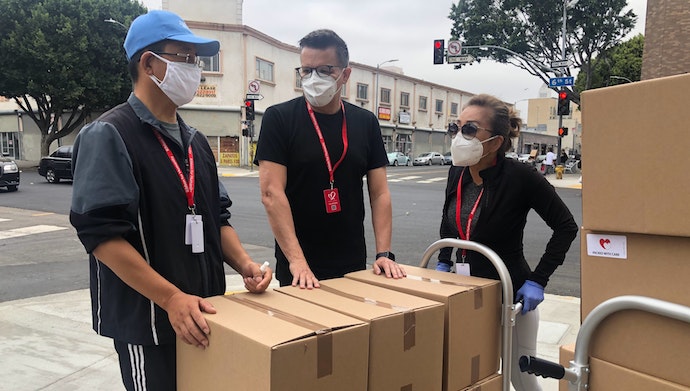
Last year, the COVID-19 pandemic caused many businesses to stay shut and forced customers to remain indoors. This has led to online shopping becoming one of the best ways for consumers to get the items they need in a fast and convenient and safe way.
It’s a phenomenon that has a far-reaching impact across the region, with the pandemic accelerating the shift to digital shopping and resulting in major changes in supply-chain interactions. We’ve seen announcements about more business owners prioritising a digital-first approach when it comes to their retail strategy.
At the same time, more people have experimented with shopping online for the first time, with existing online shoppers buying more, both in terms of the quantity and variety of items.
This has led to both shippers and customers increasingly demanding richer experiences and safety considerations, with both groups asking for uncomplicated, reliable, and safe service offerings.
But for all its convenience, shopping online can’t replace browsing and shopping in a physical retail outlet, so one of the key challenges brands face today is how they can reinterpret the in-store retail brand experience into a unique offline one that still manages to deliver that “wow” factor to their customers, further creating opportunities to cement customer loyalty
Beyond the product itself, what we’re seeing is that online shoppers prioritise delivery options and the perceived quality of delivery service when considering which company to shop with.
When selecting a logistics partner, online retailers need to consider two main issues; what needs and expectations do they and their customers have, and how are logistics companies addressing these identified issues?
Immediacy of response
In today’s customer-centric world, delighting shoppers has never been more critical, with COVID-19 putting additional pressure on customer service teams.
Part of creating a great experience is in resolving issues quickly and giving assurances of reliable outcomes. When it comes to reliability and hassle-free experiences, Ninja Van has taken on a Fantastic Service Recovery (FSR) approach to the entire parcel delivery process, and it’s an important initiative that drives our teams towards identifying and addressing potential challenges in the workflow even before they become issues and resolving problems quickly with reliable solutions.
Customers are also increasingly demanding an omnichannel brand experience, so companies that have real-time tracking and immediate communication across multiple touchpoints will satisfy that need while providing customers with convenience and peace of mind.
Our proprietary NinjaChat system does just that, offering shipping customers and online shoppers real-time tracking updates with the flexibility to directly manage their deliveries through their preferred social messaging platforms (FB messenger, Telegram, Viber, Line, etc). The system also enables users to chat directly with a member of the Ninja Van team.
This allows us to optimise our customers’ experiences, helping online retailers boost customer satisfaction and increase the likelihood of repeat sales.
Reimagining the physical network
Logistics companies that offer alternatives to doorstep delivery such as retail partner collection points and parcel lockers tend to be favoured by consumers due to the added convenience of such options.
Also Read: How Pomelo tackles the problem of high product return with its O2O retail experience
Doorstep deliveries and collection points can co-exist and provide balance in meeting expectations from both business owners and consumers. Businesses that offer both options tend to be preferred by customers due to the added convenience of such options, and have often seen improvements in trust scores and transaction volumes with business partners.
Contactless delivery
Contactless delivery is more important than ever and it is also now seen as an effective way to help businesses meet the health and safety concerns brought on by the COVID-19 pandemic. Because of this, logistics companies that do best are the ones that have developed a way to notify both shipper and customer almost instantly for each successful delivery, without the need for any physical contact.
The pandemic has underscored the importance of digital tools in helping businesses adapt to the business environment, and business owners should leverage these digital capabilities to identify opportunities for improvement and growth.
Final thoughts
I am a big advocate of the ‘less is more’ and believe that parcel deliveries should be an uncomplicated affair for both businesses and customers. We are constantly working on fine-tuning our business to make sure we’re creating solutions that are relevant and bring long-term improvements.
Last but not least, last-mile logistics will increasingly be about personalisation and scale and technology can play a crucial role in customer interactions in the years to come. The less people have to think, the more scalable a business gets and companies should leverage these opportunities brought on by technology to future-proof their business.
The winners will be those companies who can adapt and seize the opportunities emerging in this new normal.
–
Editor’s note: e27 aims to foster thought leadership by publishing contributions from the community. This season we are seeking op-eds, analysis and articles on food tech and sustainability. Share your opinion and earn a byline by submitting a post.
Join our e27 Telegram group, FB community or like the e27 Facebook page
Image credit: Alex Mecl on Unsplash
The post How the logistics partner can make or break the online shopping experience appeared first on e27.

